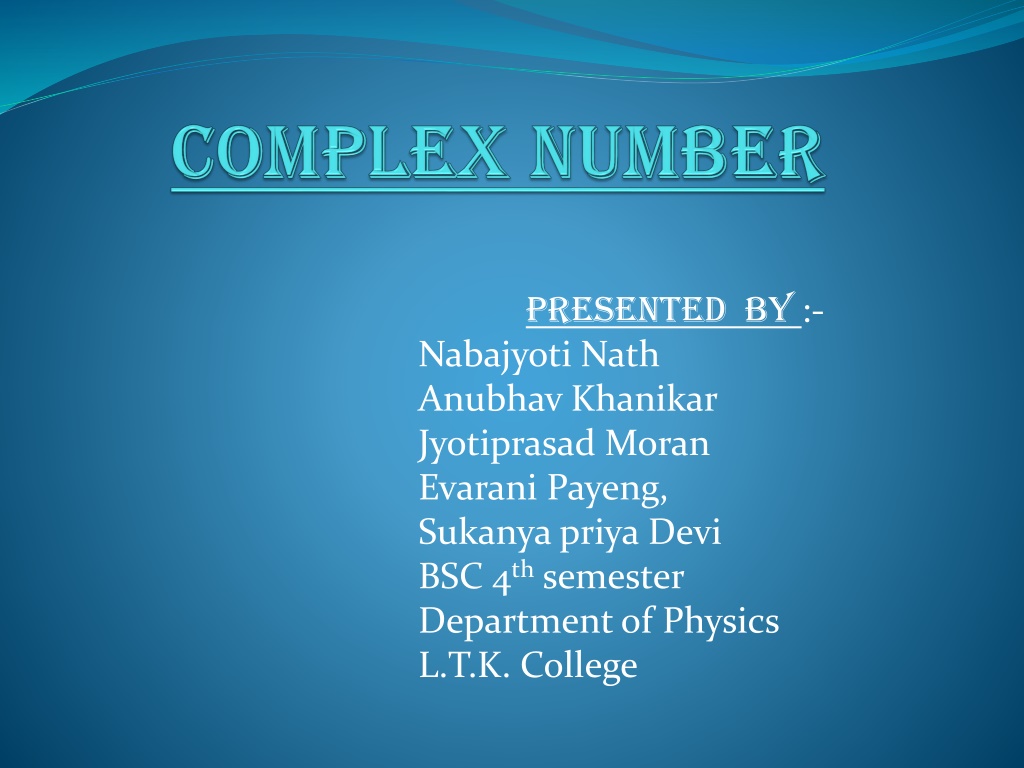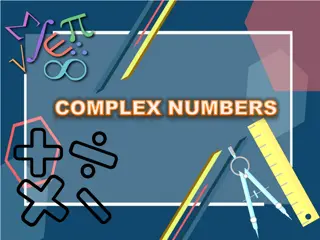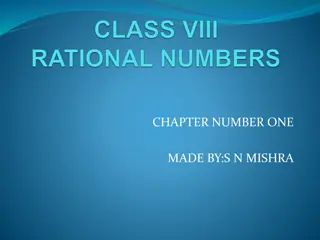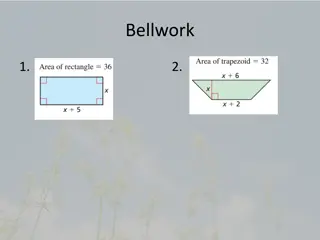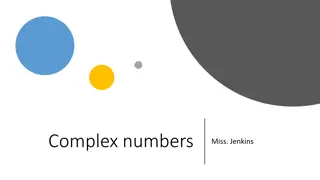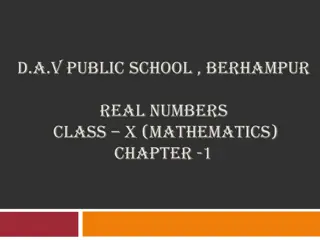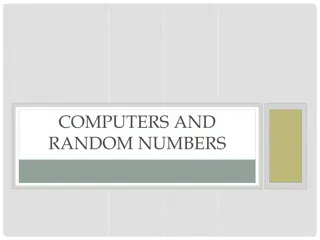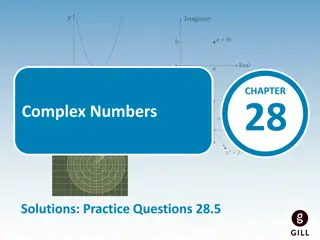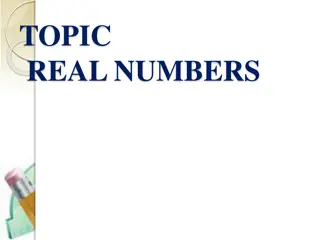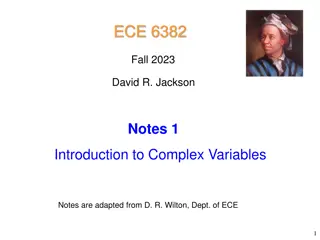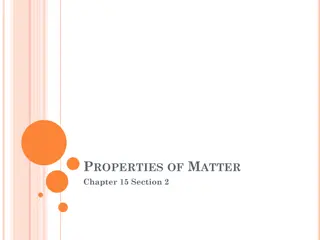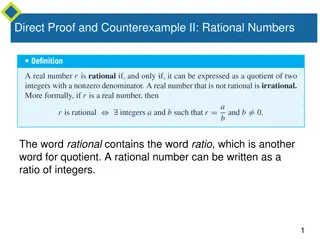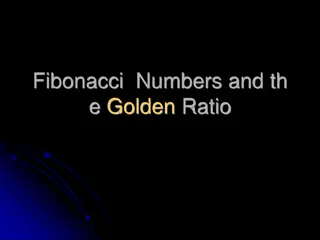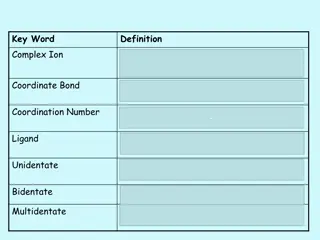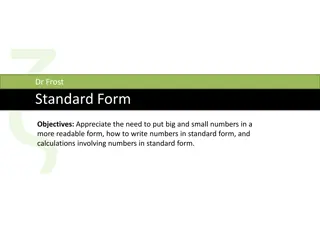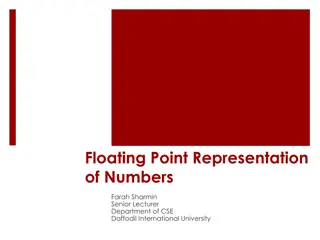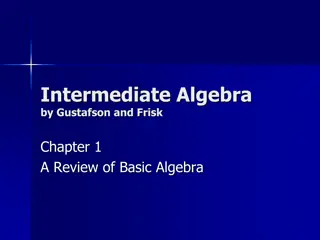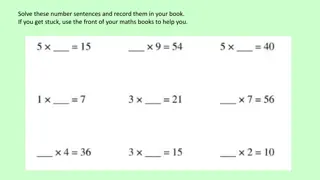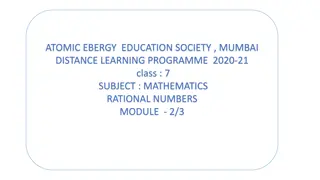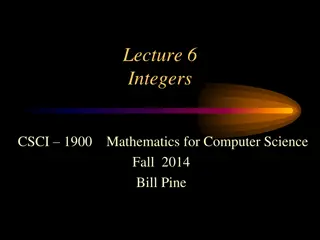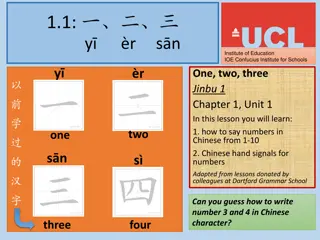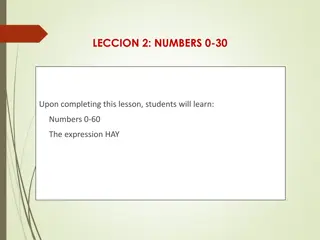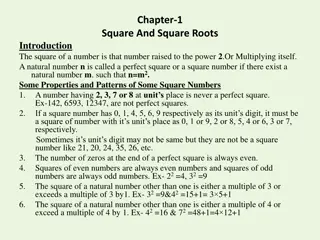Understanding Complex Numbers and Their Properties
Complex numbers are numbers of the form z = x + iy, where x and y are real numbers and i is the imaginary unit. They play a crucial role in mathematics and physics. This content covers the definition, equality, algebra, geometrical representation, and conjugate of complex numbers with detailed explanations and examples.
Download Presentation

Please find below an Image/Link to download the presentation.
The content on the website is provided AS IS for your information and personal use only. It may not be sold, licensed, or shared on other websites without obtaining consent from the author. Download presentation by click this link. If you encounter any issues during the download, it is possible that the publisher has removed the file from their server.
E N D
Presentation Transcript
Presented by :- Nabajyoti Nath Anubhav Khanikar Jyotiprasad Moran Evarani Payeng, Sukanya priya Devi BSC 4thsemester Department of Physics L.T.K. College
Definition :- A complex number is a number of the form z = x + iy ,where xand y are real umbers, and i is an imaginary unit satisfying i2=-1. If x=0, then the number said to be purely imaginary. Again if y=0 then the number x is purely a real number. For example, 2 + 3i is a complex number.
Equality of complex number :- Two complex number are equal if their real part and imaginary parts are individually equal. i.e. The two complex number a + ib = c + id if and only if a = c and b = d. For example, if x + iy = 8 i, then equating the real and imaginary parts, we get x = 8 and y = -1
Algebra of complex number :- Complex Number is an algebraic expression including the factor i = -1. Let z1= a + ib and z2= c + id, are two complex numbers, then Addition of Complex Numbers The sum of this two complex numbers z1+ z2= (a + ib) + (c + id) =(a + c) + i(b + d) Addition of complex numbers can be another complex number. Difference of two Complex Numbers Difference of this two complex numbers z1- z2= (a + ib) - (c + id) = (a c) + i (b d) Difference of complex numbers can be another complex number.
Algebra of complex number :- Multiplication of two Complex Numbers multiplication of this two complex numbers z1 z2= (a + ib) (c + id) z1 z2= (ac bd) + i(ad + bc) Division of Complex Numbers division of this two complex numbers ib a z + = 2 += + a ib c id z 1 + c id c id c id
Geometrical representation :- A complex number z = + i can be denoted as a point P( , ) in a plane called Argand plane, where is the real part and is an imaginary part. The value of i = -1.
Conjugate of Complex Number :- Conjugate of a complex number is the number with an same real part and opposite sign of imaginary part but equal in magnitude. The complex conjugate of complex number z is denoted by z . The complex conjugate of x + iy is x iy. Mirror image of Z = x + iyalong real axis will represent conjugate of given complex number Fig: Complex conjugate
MODULUS AND ARGUMENT OF COMPLEX NUMBER :- The length of the line segment, that is OP, is called the modulus of the complex number, z=( x + iy) and is denoted by |z|=| x+ iy| The angle from the positive axis to the line segment is called the argument of the complex number, z. It is denoted by arg. (z). =tan-1 (y/x) r
Properties of Modulus : Properties of Modulus :- - |z| = 0 => |z1 z2| denotes the distance between z1and z2. |z| Re(z) |z| ; equality holds on right or on left side depending upon z being positive real or negative real. |z| Imz |z| ; equality holds on right side or on left side depending upon z being purely imaginary and above the real axes or below the real axes. |z| |Re(z)| + |Im(z)| |z| ; equality holds on left side when z is purely imaginary or purely real and equality holds on right side when |Re(z)| = |Im(z)|. |z|2= z |z1z2| = |z1| |z2| z = 0 + i0
Properties of Argument Properties of Argument: : arg(z1z2) = 1+ 2= arg(z1) + arg(z2) arg (z1/z2) = 1 2= arg(z1) arg(z2) arg (zn) = n arg(z), n inclusing of all For Example: Find the argument of the complex number 2 + 2 3i. Solution: Let z = 2 + 2 3i. Here, the real part, x = 2 Imaginary part, y = 2 3 We know that the formula to find the argument of a complex number is arg (z) = tan-1(y/x) = tan-1(2 3/2)= tan-1( 3) arg (z) = tan-1(tan /3) = /3 Therefore, the argument of the complex number is /3 radian
conclusion where, a and b are real numbers and i= -1. The theory of function of complex variable is very important in solving a large number of practical problems in different branches of Physics like theory of heat, analysis of A.C circuit, electronics, quantum mechanics etc. Complex numbers are numbers of the form a + bi,
